REVIEW: SENNAN ASBESTOS DISASTER AT HKIFF 42
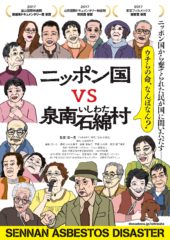
“This is the first film I’ve made where I kept searching for a theme while shooting,” says Kazuo Hara, a masterful documentarian, about his long-awaited new effort Sennan Asbestos Disaster. The subject of a special program at the 42nd Hong Kong International Film Festival in March, A Dedicated Filmmaker: Hara Kazuo, the director presented the award-winning film along with two others. Hara’s filmography is filled with records of radical individuals, including the political radical Kenzo Okuzaki in The Emperor’s Naked Army Marches On (1987).
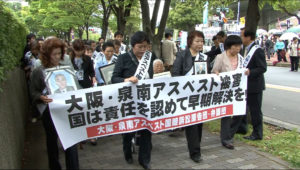 A still from the film. ©疾風プロダクション
A still from the film. ©疾風プロダクション
However, talking with Tokyo Filmgoer at the festival, the director explained that the premise is different in his latest feature: “They [the subjects] were extremely normal.” Hara’s new tour-de-force documentary focuses on the personal and legal battles of asbestos victims from Ishiwata village in the Sennan area of Osaka. The 3-hour-30-minute film moves very quickly once you realize the Japanese government is responsible for the everlasting court battle, reflected in the film’s long running time.
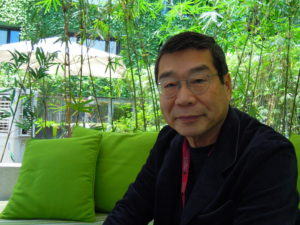 Kazuo Hara in Hong Kong. ©Kenta Kato
Kazuo Hara in Hong Kong. ©Kenta Kato
Suffused with indignation against governmental indifference to acknowledging its responsibility for the asbestos issue, Hara’s radicalism attempts to undermine the hypocrisy of bureaucrats and politicians. Having said that, the film is filled with compassion, revealing the humanistic side of Hara, who desires to do something for the good.
During the 10 years of production, there were a number of difficulties the filmmaker had to face. One of them was simply that his subjects were completely different from his prior protagonists. As the director puts it, “I couldn’t help comparing these people with Okuzaki-san and other subjects in my previous films.”
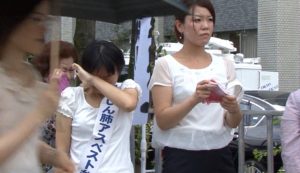 ©疾風プロダクション
©疾風プロダクション
In the second half of the film, however, Hara begins to focus on one character, Kazuyoshi Yuoka, the outspoken founder and leader of the Citizen’s Group for Sennan Asbestos Damage, who feels increasingly dissatisfied with the legal team’s approach. “The defense counsel had strict strategies on when to vent personal emotions. I assume Yuoka-san felt that expressing anger in such a restricted manner was not effective in revealing [the plaintiffs’] rage,” says Hara, who “shares the same feelings and anger with Yuoka-san.”
Not only does Hara’s work make him a man of action, but his action documentary is also based on serious contemplation. Hara’s films have been known for capturing people who unconsciously start acting in front of the camera, denaturalizing the boundary of real/unreal. Hara remembers in this film, “Not everyone was conscious of the existence of the camera.”
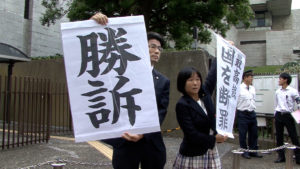 ©疾風プロダクション
©疾風プロダクション
However, Miyoko Sato, one of plaintiffs whose passionate speech creates tear-jerking moments, told the director that she was unconsciously looking for the camera during her talk. According to Hara, “It gives a lot of power when people become conscious of the camera. I always place the camera in front of my subjects, instead of concealing its existence, so that they speak to numerous other people who will watch through the lens. Strong film cannot be made unless acting generates power.”
Sennan Asbestos Disaster and its message cannot be more relevant and significant in the time of Japan’s Moritomo Gakuen scandal, which has implicated Prime Minister Shinzo Abe and his wife in a heavily discounted land sale to an Osaka-based nationalist school operator. “Yuoka-san’s message synchronizes with the current situation in Japan,” stresses Hara. “No other administration could be more hideous [than the current one]. Why do the oppressed not speak up even when the Constitution is jeopardized? Finally, I see more people expressing their anger, but honestly the number is significantly short of enough. This is indifference to and ignorance of the oppressed, which strengthens the system.”
Hara’s documentary successfully demonstrates how the Japanese system functions to control the general public and how the masses are blind to governmental power: “In any country, there is a system. And any system has the same structure: a handful of people with authority obtain profit by controlling the populace. The problem is, when people tolerate such rulers, the masses also become part of the system. Those who are oppressed have to develop the ability to see through the system.”
Sennan Asbestos Disaster was recently released in Japan.
By Kenta Kato
Kenta Kato is a Tokyo-based writer, film critic and festival programmer, currently working on his PhD in Film at Waseda University.
Please be sure to check with the theater before going.
